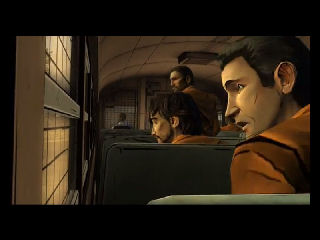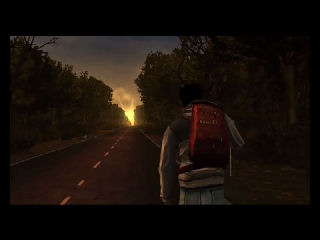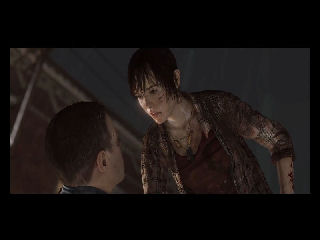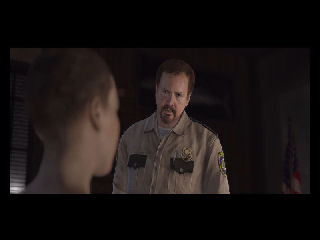E3 Part IV: Zombies, Souls and Ellen Page
Ray wraps up his coverage of E3 2013
The games in this edition of my 2013 E3 Report are not for the faint of heart! In addition to being very adult entertainment, both in the format of my favorite sub-genre of adventure: The Interactive Movie.
The Walking Dead: 400 Days
For some years now, Telltale Games has been presenting some of the most innovative new adventure games in addition to retooling such classics as the Monkey Island games.
Their Walking Dead episodic adventure was released in five episodes last year to great acclaim. I really admired the project, for several reasons:
First of all, Robert Kirkman could have easily cashed in and made big bank on licensing his popular comic book series as the next big-budget zombie game from Electronic Arts or Activision. Instead, he went with adventure game developer Telltale, because he was interested in storytelling.

Second, Telltale’s episodic game used the comics and the television show as a jumping off points, but tells its own story.
Third, the games have a fantastic, animated-comic-book look.
But mostly, it’s the gameplay. The hallmark of this series of episodic games is storytelling, and what’s fun about the way it works is how much the story is a collaboration between the game designers and the player.
Rather than a solid action-packed zombie terror adventure, the game follows very human stories of compelling characters trying to live one more day, one more hour, one more minute in an absolutely horrible situation. It’s essentially an interactive movie.

400 Days follows the same format. As characters talk to one another, you get to choose responses and shape the direction of the conversations. But that’s just the beginning of the choices you make. You choose everything from who to feed to who to confide in to whose life to save. Frequently these choices are wrenching to make; but as upsetting as they can be, they make you feel totally invested with your characters.
Even better, the game keeps track of all of your choices. Side with someone in an argument and he’ll remember your loyalty. Decide to confide in another character and he’ll remember the information. The game essentially remembers every decision you make, even to who lives and dies.
As you play the episodes, all of your decisions become part of the fabric of the game’s reality. Example: Near the end of Episode 1: A New Day, you have to make a horrifying choice between saving one person and letting another one die. When you begin the next episode, the game carries that information over.

Plot-wise, 400 Days serves as a bridge between the first season of the game and the upcoming Season 2. If you play it on the same device as you played the first episodes, it remembers all of your choices.
400 Days follows several different characters whose lives can become entwined with those of the first season.
The character we saw in the demo was a prisoner, chained to his seat in a prison bus with two other inmates. As the scene begins, your character chats with the prisoner whose chained in front of you (a possible child molester) and the one behind you (a Bernie-Madoff-type embezzler). When all hell breaks loose a few minutes into the story, you have to make a horrifying choice between saving one of your fellow prisoners and sacrificing the other to the zombie horde.
The game’s interface is quite elegant, giving you easy-to-follow choices of how to interact with your environment. These choices turn into quick time events when things go sour and the zombies get close. As nerve-wracking as it can be, as I mentioned earlier, you are making these decisions, and it makes the story feel like your story. Even when you make mistakes (Man! I should have helped HER instead of HIM!), your regret feels weirdly like real life: you have to live with your choices and actions.

As a fan of the The Walking Dead: Season One, I’m really looking forward to this extra adventure. It will be available in July for PC and consoles for $4.99.
I actually don’t recommend that you play 400 Days without starting with the first season episodes. if you haven’t played those, I HIGHLY recommend them. But remember: They are VERY much games for adults: gory, scary, upsetting, and with salty language.
Beyond Two Souls
Telltale isn’t the only outfit around cooking up vibrant and thrilling “interactive movies.”
I hope that, like me, you are a huge fan of French developer Quantic Dream. Since it was formed in 1997 it has only released three games, but all three have been remarkable. Anyone remember 1999’s Omikron: The Nomad Soul? One of the coolest and most interesting hybrid games of its era, the game takes place in a vibrantly alive futuristic city and features a fascinating game mechanic that allows the player to jump into different characters at will.

Quantic Dream’s second game is Indigo Prophecy, which is more of a pure adventure than the first game. It is an interactive movie that tells its story through a series of Quick Time events. Emphasis is on storytelling and character. While the results are dynamic and interesting, the game is marred slightly by the fact that the interface is a bit clunky: In order to properly focus on the Quick Time cues on screen, you aren’t able to focus on the fabulous action sequences that are going on.
Their third game, Heavy Rain, goes a long way towards solving this problem. Another game about violence and doom, the interface is much more elegant. As I played it, I never felt divorced from the action. In addition, the rich storytelling provided many opportunities for me to make important choices that made the story feel like my story. Quantic Dream had also come a long way in their graphic technology, so that the character models’ faces and “performances” are more convincing than ever.
How good was Heavy Rain? Well, I’ll put it to you this way: It’s a PS3 exclusive, and it’s one of the reasons I purchased the expensive piece of Sony hardware.

At last week’s E3 I got the chance to play a thirty-minute sequence in Quantic Dream’s upcoming game, Beyond Two Souls. The game takes you through fifteen years of the life of main character Jodie Holmes, who is played by movie star Ellen Page. While having a big Hollywood actor appear in a game is nothing new, what makes this instance interesting is that Page not only provides the voice, but the motion capture as well. In addition, the character of Jodie looks just like Ellen Page.
I want to be cautious about how I talk on this topic. While I don’t mind stars appearing in games, I don’t for a minute think that spending the money on a star makes your game necessarily better. I have friends who work in voice recording for big studio games, and they always prefer to work with talented and unfamous voice performers rather than with big names. And most of the best performances I’ve encountered in games — Steve Valentine in the Dragon Age games, Nolan North as Nathan Drake in the Uncharted Games, Tony Jay in anything – have not been movie stars.

However, I do admire weirdo actress Ellen Page, and evidently she brought unusual commitment and heart to her work in Beyond Two Souls.
And I must admit that, as a fan of hers, controlling a character who looks and sounds like her is a pretty cool novelty.
Now, on to the game sequence:
In the sequence they let us play through at E3, Jodie is in the middle of some really bad stuff happening in a war-torn, Mogadishu-like city. She’s escorting a young boy through a series of horrifically dangerous situations.
Beyond Two Souls, like Heavy Rain and Indigo Prophecy, is an interactive movie. And I am delighted to report that the interface and controls that Quantic Dream refined so successfully from Indigo to Rain have been even more streamlined for the new game. The interface nearly disappears, and it’s as if the PS3 controller simply becomes part of your (and Jodie’s) body. I am pretty sure after playing an hour or two of the game, I’ll practically forget about the controls completely.

And while the sequence I played might superficially look like just another action game, it absolutely is not. It was clearly a high-action sequence in an adventure game. While most of this sequence was simply about surviving, you still have a few important choices to make that have consequences. At the end of the sequence, I felt breathless and exhausted, and yet ready for more. I am eager to play the whole game when it comes out in October.
Note: It’s also a PS3 exclusive!

Leave a Reply